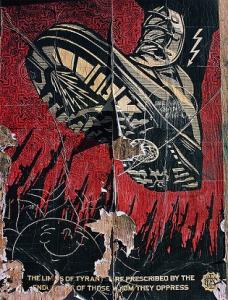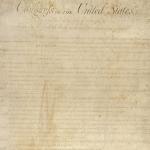Oppression is when powerless people get stomped on by those who have legal, political, or economic power. God’s law commands us repeatedly not to “oppress” the widow, the orphan, or the alien, the groups who were the most vulnerable to exploitation.

There are several different terms for “oppression” in the Hebrew Bible. Two of them are used in the same sentence in Exodus 22:21. One of them (lachatz) means to press someone hard. It is used for Balaam’s donkey shoving Balaam’s foot against a stone wall. It’s also used for when the Amorites shove the tribe of Dan back into the hills after they try to settle in the coastal plain. The other word (toneh) is a word that means to exploit someone. This word is used in Leviticus 25:14, where it says that in selling land, Israelites are not to exploit one another by charging more than the land is worth.
Another common word for oppression (‘ashaq) clearly means to practice extortion. Another word (‘innah) means to humble or subdue someone by treating them harshly. In Isaiah’s famous line “Seek justice, correct oppression” (Isaiah 1:17), the word is a rare word that means “ruthlessness.” And in Isaiah’s famous line “to let the oppressed go free” (Isa 58:6), the word means literally “those who have been crushed.”
One example of the use of power to coerce was Twitter’s lawsuit against a small Des Moines company who held the copyright on the use of the word “tweet.” (See http://siliconprairienews.com/2011/10/angry-birds-settle-twitter-iowa-based-twittad-hash-out-tweet-deal/.) Twitter sought to simply crush the small company’s right, because it had the muscle to do so. That’s how oppression works.
Eminent domain could be cited as another example of oppression. Leviticus 25:23 proclaims that all land belongs to God, and cannot be confiscated. The story of Naboth’s vineyard shows that even wicked king Ahab understood that he did not have eminent domain over the inalienable rights of Naboth to his ancestral inheritance (1 Kings 21:3). Only Jezebel, a Canaanite who had no moral hang-ups, sees the issue through modern eyes.
Deuteronomy 23:17 commands Israel not to exploit (toneh) escaped slaves, who were powerless and completely at the mercy of their hosts. Leviticus 25:14 also commands Israelites not to toneh their neighbor when selling land by unfair pricing.
What is a fair price or wage? Other contemporary law codes such as the Law of Hammurabi and the Law of Eshnunna gave official fair prices for wages, rent, and even doctor’s fees; the Hittite Law even gives a list of fair prices for merchandise. The Torah gives us none of these specific fair prices. I wish it had done so, but at least by not doing so, it avoids the problem in our U.S. Constitution of stating prices that are now woefully outdated. Even if the Torah had given us such prices, they would be useful for us only by comparison in the context of the time period in which it was decreed.
So, is a fair price always whatever the market can bear? There seems to be a difference between the price of a Super Bowl ticket or the price of lodging that night in that city, neither of which are necessities, and the price of necessities after a hurricane. Proverbs 11:26 would appear to apply here: “The people curse those who hold back grain [in order to gouge the public], but a blessing is on the head of those who sell it.”
The verb lachatz is used to describe the way the Egyptians treated the Hebrews, involving forced labor and violence. In Leviticus 25:44-46, where the Israelites are permitted to enslave pagan nations, Moses insists that slaves who are fellow Israelites must not be treated with “harshness.” Here, the word used is parek, the same word used for how the Israelites themselves were treated in Egypt (Exodus 1:13-14).
God’s commands on how to treat aliens in Israel deserve special attention. In Deuteronomy 24:14, Israel is forbidden to practice the exploitation (‘ashaq) of immigrants that prevailed in virtually all surrounding cultures at that time, which was similar to today’s treatment of illegals by smugglers, or by employers who exploit the immigration status of their workers with threats to deport them if they complain of unjust working conditions.
Any monopoly creates the kind of power that can lead to oppression, whether it be centralized health care (where who gets a kidney or heart operation may become a matter of political favoritism), or whether it be business versus union labor, a case that can work either way, depending on which side has collected more coercive power. One critic of unions writes that nobody has a moral right to force anyone to employ them at the price they demand, or to forcibly prevent the employer from hiring others. He says, “The attempt to use violence to force an employer to pay a desired non-economic wage is clearly robbery.” Both employers and unions have at times been guilty of using the kind of coercion that God’s law would call oppression.
It is from God’s word that we derive the principle that might does not make right. Without God’s word, naked power is answerable to no one.












